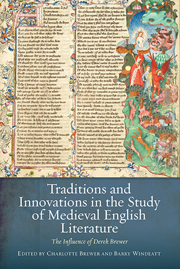 Traditions and Innovations in the Study of Medieval English Literature
Traditions and Innovations in the Study of Medieval English Literature Book contents
- Frontmatter
- Contents
- List of Contributors
- Acknowledgements
- Note on References
- Introduction: A Modern Medievalist's Career
- 1 Derek Brewer: Chaucerian Studies 1953–78
- 2 Brewer's Chaucer and the Knightly Virtues
- 3 Class Distinction and the French of England
- 4 Time in Troilus and Criseyde
- 5 Virtue, Intention and the Mind's Eye in Troilus and Criseyde
- 6 Falling in Love in the Middle Ages
- 7 The Idea of Feminine Beauty in Troilus and Criseyde, or Criseyde's Eyebrow
- 8 ‘Greater Love Hath No Man’: Friendship in Medieval English Romance
- 9 Gowerian Laughter
- 10 Derek Brewer's Romance
- 11 Malory and Late Medieval Arthurian Cycles
- 12 The Ends of Storytelling
- 13 Manuscripts, Facsimiles, Approaches to Editing
- 14 Words and Dictionaries: OED, MED and Chaucer
- 15 Afterlives: The Fabulous History of Venus
- Afterword: Derek Brewer: with ful deuout corage
- Bibliography
- Index
- Tabula in Memoriam
10 - Derek Brewer's Romance
Published online by Cambridge University Press: 05 September 2013
- Frontmatter
- Contents
- List of Contributors
- Acknowledgements
- Note on References
- Introduction: A Modern Medievalist's Career
- 1 Derek Brewer: Chaucerian Studies 1953–78
- 2 Brewer's Chaucer and the Knightly Virtues
- 3 Class Distinction and the French of England
- 4 Time in Troilus and Criseyde
- 5 Virtue, Intention and the Mind's Eye in Troilus and Criseyde
- 6 Falling in Love in the Middle Ages
- 7 The Idea of Feminine Beauty in Troilus and Criseyde, or Criseyde's Eyebrow
- 8 ‘Greater Love Hath No Man’: Friendship in Medieval English Romance
- 9 Gowerian Laughter
- 10 Derek Brewer's Romance
- 11 Malory and Late Medieval Arthurian Cycles
- 12 The Ends of Storytelling
- 13 Manuscripts, Facsimiles, Approaches to Editing
- 14 Words and Dictionaries: OED, MED and Chaucer
- 15 Afterlives: The Fabulous History of Venus
- Afterword: Derek Brewer: with ful deuout corage
- Bibliography
- Index
- Tabula in Memoriam
Summary
Derek brewer distributed his abundant scholarly energies and gifts among three distinct areas: Chaucer studies, Malory and romance. In this essay I develop Brewer's clear, consistent and, in my view, almost wholly accurate understanding of one of these areas, that of romance. I do so in the conviction that Middle English scholarship continues to labour under the spell of disabling generic confusions about romance. Above all, it continues to set tragic literary texts in the same category as ‘comic’ literary texts. By tragedy I mean works about kings that end unhappily both for the kings and for the societies they ruled; by comedy I mean works about the usually aristocratic young that usually end happily. A confusion of this magnitude is a major confusion.
Brewer's two essential contributions were made in the late 1970s and early 1980s (1978c and 1980: 158–80). Along with those of others, and especially that of Kathryn Hume (1974), his contributions should, in my view, have largely dispelled muddle and set us on a new path. That redirection did not, however, happen. In this essay I re-present Brewer's argument.
I also develop it. Brewer articulated both how romances work and what they mean. In my view, his understanding of how they work is wholly persuasive; he applied his particular understanding of what they often mean, however, rather too liberally. Here, I leave aside critique of Brewer's too liberal application of the family drama meaning of romance; instead, I capitalize on his fundamental perceptions about how romances work, to underline the profound wisdom of this apparently trivial genre.
- Type
- Chapter
- Information
- Traditions and Innovations in the Study of Medieval English LiteratureThe Influence of Derek Brewer, pp. 154 - 172Publisher: Boydell & BrewerPrint publication year: 2013
